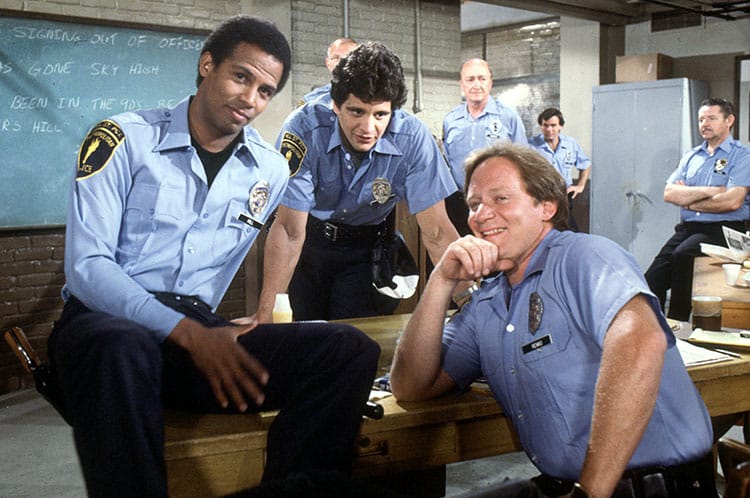What Are Cop Shows For?

For many complex and valid political reasons, copaganda has been a topic of conversation in television. After the murder of George Floyd, the cam series Cops was cancelled and the creators of Brooklyn Nine-Nine decided to end the show. Cops act as physical enforcers of the ruling law and government and there's plenty of harmful media that educates people to be helpful and subservient to cops rather than question authority. Framing cops as upstanding pillars of the community, given an impossible task and frequently putting their lives on the line for their country, whitewashes all of the actual crime, corruption, and lack of action that actually populates the field.
Cop shows, however, have remained a staple of TV since the very beginning, being some of the most recognized, artistic, and challenging voices on television. There's always been a question of if a depiction of a mass violence such as war is inherently a glorification of it through its recreation, and the same said could be said of police. Even if you are critical of police work, is having the focus of the show be the daily lives of cops going to instill pathos for theoretically despicable characters?
One of the most pressing problems is the way even corrupt systems have been portrayed. While often complex and nuanced, shows like Hill Street Blues and Starsky & Hutch feature a cast of ideal "good" cops (as opposed to other districts or boroughs) with decent intentions that conceivably make the argument that the system could work if only the "right" people were in charge, ignoring the fundamental issues at the heart of the law enforcement project.


Generally, where law is involved, stories center around a moral or social conflict. Crucially, all these shows featured exciting stories and intense action that were a staple of TV dramas. Early private detective shows were extremely popular as a continuation of American noir's popularity (I'll be talking about Johnny Staccato this Friday) and it's focus on man vs. modern society. Westerns absolutely ruled the airwaves for 30+ years and centered on the role of morality vs. the enforcement of law in uncivilized and informal spaces. I feel as though police shows were the third branch of this thorny wrestling with personhood and authority, the pressure of the state vs. the pressure of the personal.
This is all to say that I fully see, understand, and in many cases, support, the critique of modern media's portrayal of police. I've never been able to stomach shows like NCIS or CSI that constantly promote what heroes the protagonists are for, seemingly, being American. Although I've watched almost all of 9-1-1, I've found it extremely difficult and uncomfortable to sit through Angela Bassett's police sergeant plotlines. Except all those shows were developed and aired post-9/11, in the changed Bush (or later) landscape that was hellbent on drumming up support for various wars against foreign middle eastern countries. The definition of "public safety" seems to have changed over the years. The old "serve & protect" used to lean heaving on the serve, having a feeling for the community around you and working to better it. But "serve" has leaned over to "protect" now, where the public is treated as inconvenient children who must have terrible things done on their behalf for their own good. The intense militarization of the police on television seems to only have happened around the turn of the century, which means there's a good 50 years of shows that depicted a different purpose of police work.
I don't think those shows were devoid of any copaganda at all, it was certainly a running throughline of many of the shows. Hill Street Blues makes the argument that police are attacked on all sides, by the government that is supposed to support them and the community that is supposed to respect them. Shows like Andy Griffith or Barney Miller focused on a small group of people who became friendly or funny faces of authority. But the shows also featured different facets of society and tried to answer difficult moral questions with as much empathy as possible. Perhaps what we are seeing now are shows where the main reason for existence is delivering a specific message of enforcement and control rather than a byproduct of the types of stories the writers wanted to explore.
Was this all a lead-up to talk a bunch about Starsky & Hutch again? Partially, because it's the cop show I'm most familiar with at this point. S&H can very credibly be accused of copaganda and refusing to wrestle with some of the uglier sides of policework (such as never giving Dobey room to speak about being a black cop), yet at the same time was devoted to treating addicts, outcasts, and assault victims with unheard of degrees of understanding and kindness. It often portrayed the legal system as a hindrance to actual justice, the boys fuming every time their hands were tied to help those around them, with the governmental mistrust and conspiracy jadedness that went along with the Watergate era. A lot of the time it was frustrating for me to watch because Starsky and Hutch would bitch about how much the system stinks and how little they were actually making a difference, something rarely seen on TV at that time, without making the final step to "maybe this system is not the one we should have at all." (To ask that of them would be pretty incredible but it was still upsetting to see them fall short.)
The quadrilogy that wraps up the show makes the bold move to have Hutch, after botching a witness protection assignment and a season of deep despondence, decide to quit the police force with Starsky, naturally, following suit. Being a policeman weighs too heavy on the soul and doesn't accomplish actual change, the show seems to argue. By the end of the narrative, the mayor has reinstated their badges, but it remains up in the air what they personally want to do with their careers. To question the role so deeply as both a personal and societal dilemma is something that, I would argue, muddies the waters of calling it copaganda. Not simply because I like the show, or to suggest that it's incapable of racism or sexism, but because at its heart it doesn't really care about promoting a cop agenda at all. To admit that this show isn't copaganda though, throws into question what other similar shows may offer in terms of reading against the grain. Police shows are some of the most popular to have ever existed, and while we're examining why that is and who it serves, it helps to approach each show individually rather than as a generic monolith.
Addendum: There are so many cop shows and nuances I would have loved to have included here. I don't consider this my final or definitive word about anything but a summation of what I've been thinking about recently. I didn't even get to Dragnet or Naked City! Fifty years is a lot to cover and while I hope it's clear that none of my writing is the last word on anything, I wanted to explicitly make room for all the stuff that didn't make it in.
Note: Next weekend is DC-Slash Con! The Monday edition may be delayed as a result.
The Fanthropologist is a weekly newsletter by Lena Barkin. Friday discussion posts are exclusive to paid subscribers. If you'd like to support the newsletter; tell your friends, consider leaving a tip, or sign up for a free subscription.

Member discussion